Comparison: 7 Best Enterprise Ecommerce Platforms for Composable Commerce

“Customer experience” isn’t just a buzzword anymore; it’s the lifeline of eCommerce business.
In a world where every click counts and every interaction shapes brand loyalty, your online presence must stand out. And here comes “composable commerce” that takes your eCommerce site or business to the next level.
But, how do you navigate this Digital Commerce without the right tools and partners? It’s like setting sail without a compass, right?
Fear not, because, in this blog post, we’re your compass, guiding you through the best enterprise eCommerce platforms and vendors. The insights and recommendations you’ll find here are to equip you with the knowledge you need to make informed decisions and elevate your enterprise business to new heights.
So, let’s get started with the Best of Breed composable platforms!
What are the Best Enterprise Ecommerce Platforms?
At the heart of Composable Commerce lies the robust foundation of Enterprise E-commerce Platforms. These platforms serve as the central hub for online stores, orchestrating the intricate symphony of online retail operations.
Here are the Best Enterprise E-commerce Platforms:
- commercetool
- BigCommerce
- Spryker
- VTEX
- Shopify Plus
- Salesforce Commerce Cloud
- BetterCommerce
Let’s explore them in detail.
1. commercetools
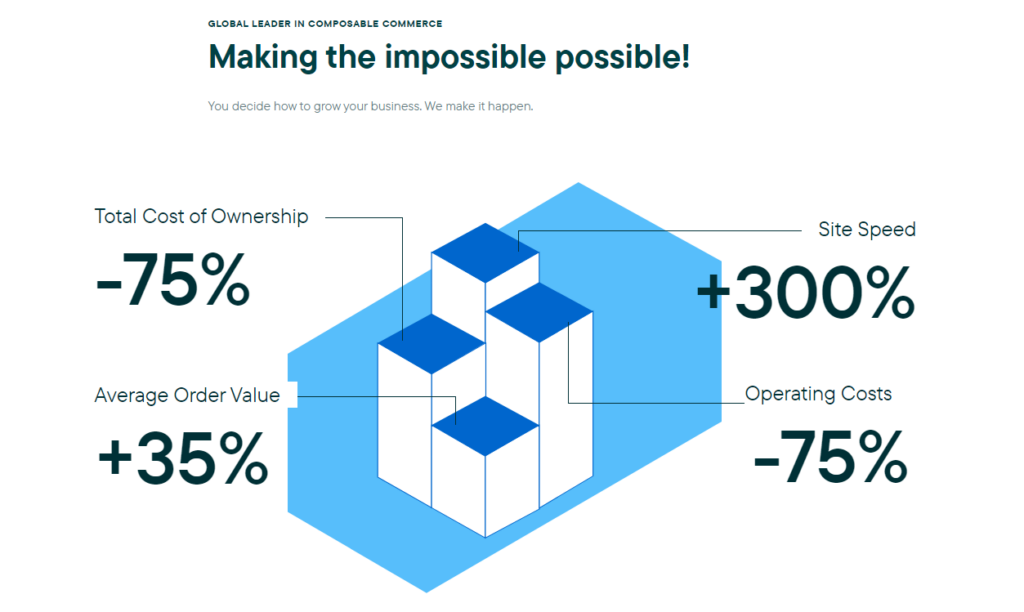
So the first rank goes to “commercetools”!!
commercetools takes center stage as a Leader in Gartner® Magic Quadrant™ for Digital Commerce 2023, and grabs the first position for Composable Commerce use cases (in Gartner Critical Capabilities for Digital Commerce 2023 report). Impressive, right??
It offers a robust multi-tenant Software as a Service (SaaS) platform hosted on Google Cloud Platform and AWS.
Its core commerce offerings encompass B2B, B2C, and Frontend solutions, supplemented by a range of functional add-ons.
Key Features
- Modularity: commercetools adopts a modular architecture, empowering customers to tailor their e-commerce functionality precisely to their requirements. This modular approach supports customization and scalability concurrently.
- Flexible Data Model: The platform offers a flexible data model that allows businesses to easily extend their functionality and adapt to changing needs.
- Decoupled Front End: commercetools promotes a decoupled front-end approach, allowing businesses to implement their storefront using native, third-party, or custom-built solutions. This flexibility ensures a tailored and world-class customer experience.
Why commercetools?
- Modular Agility: The modular architecture enables businesses to adapt and innovate with ease, creating tailored e-commerce experiences that meet their unique requirements.
- Global Enterprise Focus: commercetools specializes in serving the needs of large global organizations, making it an ideal choice for enterprises with substantial GMV.
- Global Reach: With a presence in all major regions and a robust infrastructure, commercetools is well-equipped to support enterprises on a global scale.
Limitations of commercetools
- No frontend support: commercetools is a headless commerce platform, which means that it does not come with a built-in storefront.
- Not for medium-sized businesses: Commercetools is best suited for large and complex businesses with the budget and resources to implement and manage the platform.
- Limited B2B functionality: commercetools supports both B2B and B2C solutions, but it is not as well-suited for B2B as some other enterprise eCommerce platforms. Some B2B features, such as customer group-specific catalogs and price lists, are missing.
Pricing
The commercetools platform’s pricing structure is flexible, influenced by factors like order volume, Gross Merchandise Value (GMV), SKU count, and project complexity. Notably, customers can acquire additional order volume if they surpass their package limits.
2. BigCommerce
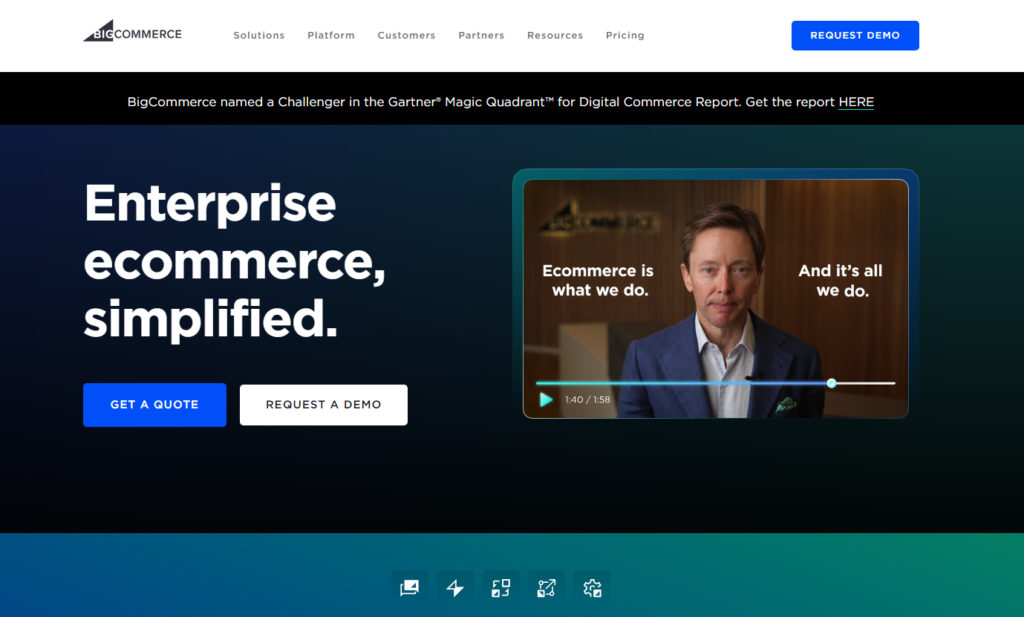
Yeah, now comes the Challenger!!!
BigCommerce takes its place as a Challenger in Gartner’s Magic Quadrant, offering a robust digital commerce platform hosted on the Google Cloud Platform.
This versatile commerce platform caters to both B2B and B2C use cases, all within the same platform. Additionally, for enterprise-level functionality, BigCommerce offers the B2B Edition add-on, highlighting advanced features such as sales representative support, account and budget, inventory management,, and quote management.
BigCommerce remains a contender in the enterprise e-commerce landscape, offering the tools needed to thrive in the digital marketplace.
Key Features
BigCommerce’s feature set is designed to empower businesses of all sizes:
- Full-featured online store
- Multi-currency (display, transact & settle)
- Page Builder
- Sales channels (including eBay, Amazon, and POS)
- Coupons, discounts, and gift cards
- Real-time shipping quotes
- Fully customizable checkout
- Headless capabilities and integrations
- Multi-Storefront
- Extended Functionality via App Marketplace
- Abandoned cart saver
- Customer groups and segmentation
- Google Customer Reviews
- Faceted search (product filtering)
- Custom facets
- Unlimited API calls
Why BigCommerce?
- Headless Flexibility: Enjoy the benefits of a headless architecture with native and third-party options for tailored storefronts and experiences.
- Channel Integration: Following the Feedonomics acquisition, BigCommerce enhances its channel integration solutions, allowing for seamless multichannel operations.
- B2B and B2C Support: One of BigCommerce’s standout features is its ability to handle both B2B and B2C requirements on the same platform.
- Sustained Growth: BigCommerce’s consistent growth reflects its viability and commitment to innovation, ensuring your business stays ahead.
- Robust Ecosystem: Leverage an extensive library of third-party applications to enhance every facet of your e-commerce operation.
Limitations of BigCommerce
- Annual sales limits: BigCommerce has annual sales limits on all plans. If you exceed your sales limit, you will be automatically upgraded to a higher plan, which can be expensive.
- Steep learning curve: BigCommerce can be a complex platform to learn, especially for users with no prior experience with eCommerce platforms.
- Slow performance: Some users have reported that BigCommerce can be slow, especially when dealing with large product catalogs or high traffic volumes.
- Limited customer support: Some users have reported that BigCommerce’s customer support can be slow and unhelpful.
Pricing: Know pricing here!
3. Spryker
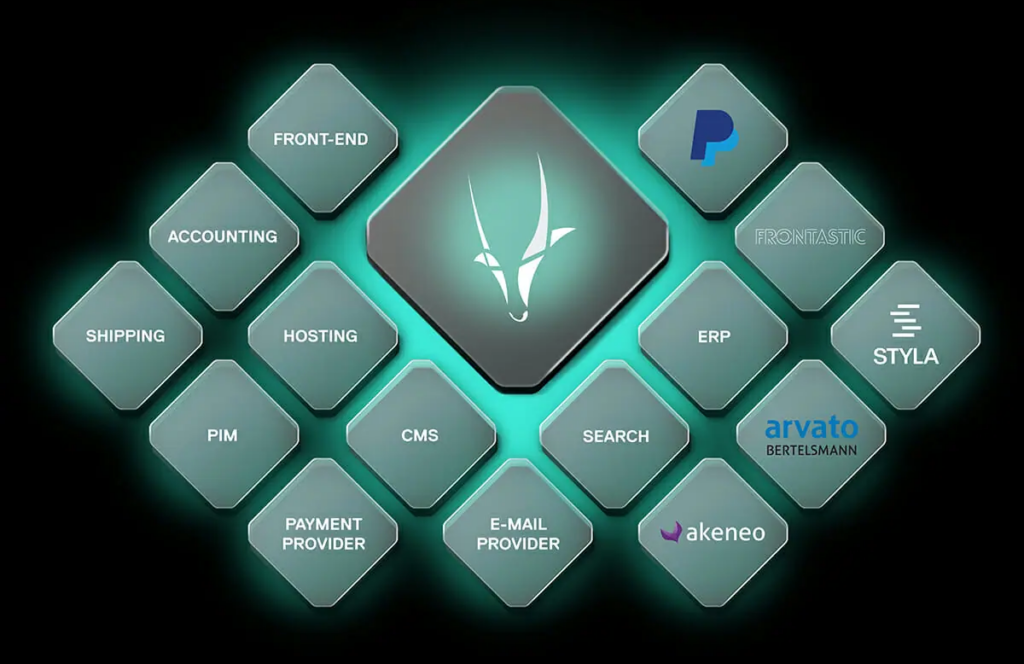
Spryker is the leading composable commerce platform for enterprises with sophisticated business models to enable growth, innovation, and differentiation.
Designed specifically for sophisticated transactional business, Spryker’s easy-to-use, headless, API-first model offers a best-of-breed approach that provides businesses the flexibility to adapt, scale, and quickly go to market.
As a global platform leader for Enterprise Marketplaces, Thing Commerce, B2B, and D2C, Spryker has empowered 150+ global enterprise companies and customers worldwide and is trusted by brands such as ALDI, Siemens, Hilti, and Ricoh.
Key Features
- Composable Architecture: Spryker’s composable platform offers a best-of-breed approach, providing enterprises the flexibility needed to adjust to a constantly changing market, to accelerate digital growth and digital transformation.
- Headless: Spryker is headless, so customers can separate frontend and backend allowing for greater flexibility in designing and delivering customer experiences across different channels.
- API-First: Spryker is built with an API-first approach, making it easier to integrate with external systems and services, as well as enabling the development of custom frontend applications.
- Packaged Business Capabilities (PBCs): PBCs are an independent assembly of features that are grouped into larger clusters. PBCs contribute to business agility by making decisions on the benefits and usability of software faster and easier for all involved parties – from IT specialists to end-users.
- Composable Value Services: is a set of tools, resources, and expert support provided by Spryker and its partners. Together, they ensure faster ROI and an accelerated timeline from adoption to achieving business outcomes.
- App Composition Platform: The platform allows Spryker Cloud customers to try out third-party services with their online business in the most seamless, secure, and curated way.
Why Spryker?
- Efficiency: Designed specifically for sophisticated transactional businesses, Spryker’s capabilities facilitate a faster time-to-value for business models such as B2B Commerce, Enterprise Marketplaces, and Thing Commerce.
- Composability: Spryker’s composable platform offers a best-of-breed approach, providing enterprises the flexibility needed to adjust to a constantly changing market, to accelerate digital growth and digital transformation.
- Ecosystem support: Spryker’s expansive community of technical and solution partners, a strong team of experts, and deep market knowledge provide enterprises with the tools and support they need to accomplish their current and future business goals.
- Active community: CommerceQuest is a community platform where customers, partners, and freelancers contribute their knowledge and experience to mutually benefit each other.
Limitations of Spryker
- Documentation and support: Some users have raised questions about the documentation and support provided by Spryker.
- Complexity and learning curve: Spryker is a powerful and flexible platform, but it can be complex to implement and use, especially for smaller companies or those with limited resources. It requires a high level of knowledge and expertise, and inexperienced developers may find it challenging to implement successfully.
Pricing
Spryker uses a subscription-based pricing model, with the cost varying depending on the size and complexity of your business, as well as the features and functionality you require. Book a Demo!
4. VTEX

VTEX is a global enterprise digital commerce platform provider with more than 2,500 customers in 38 countries around the world. VTEX offers a Composable and Complete solution known as the VTEX Commerce Platform.
VTEX was the only vendor that Gartner rated in the top five for all use cases they evaluated in the 2023 Critical Capabilities for Digital Commerce report. In the same report, Gartner rates VTEX in the top three for the Composable Commerce use case.
These services enable organizations to get up and running quickly while also giving them the flexibility to compose experiences tailored to their business needs through customization and integration with third-party best-of-breed solutions.
VTEX eliminates the complexity of headless and composable commerce projects so you can focus on building your differentiation.
Key Features
- B2C and B2B Digital Commerce
- VTEX IO Development Platform
- Experience Management
- Order Management
- Marketplace Management
Why VTEX?
- Modern platform: VTEX offers a modular API-first platform, a headless CMS, and a low-code development platform.
- Support for unified commerce: VTEX offers and enhances key functionality for retailers and manufacturers with add-on apps. It also has sophisticated promotion capabilities and marketplace operations and management.
- Extensive application partner ecosystem: VTEX offers a wide-ranging third-party ecosystem with integrations in various categories.
- Lower cost of ownership and platform maintenance cost
Limitations of VTEX
- Limited storefront personalization: VTEX’s storefront personalization capabilities are not as robust as those of some other enterprise eCommerce platforms.
- Limited B2B support: While VTEX does offer some B2B features, its support for B2B commerce is not as robust as some other enterprise eCommerce platforms.
- Limited customization options: VTEX offers a wide range of features and functionality out of the box, but its customization options are somewhat limited.
Pricing
VTEX pricing consists of two components, a monthly platform license fee and a shared success feel that aligns with the number of orders or GMV transacted through the platform.
5. Shopify Plus
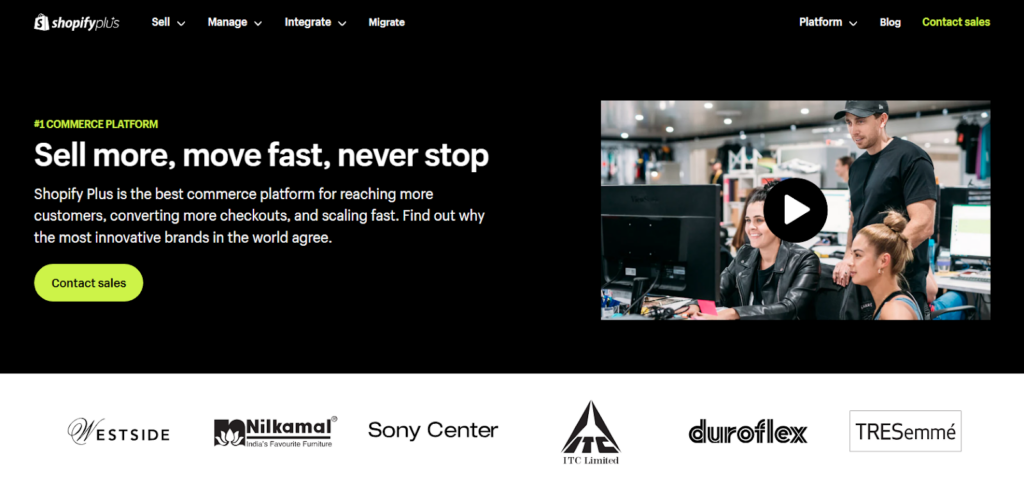
Shopify is personally my favorite eCommerce platform and both of us, Gartner® Magic Quadrant™ survey and I, find it as a leader in the Digital Commerce world.
Shopify offers a versatile product portfolio that caters to various eCommerce industry needs. From payments and point-of-sale solutions to seamless social and marketplace integration, Shopify is a go-to choice for many enterprises.
This self-hosted platform is particularly known for its Shopify Plus offering, which serves midsize to large retail and brand clients, primarily in North America.
Key Features
Shopify boasts a comprehensive suite of B2C-specific tools that seamlessly integrate into your business operations:
- Headless Commerce Platform: A powerful foundation for creating a customizable and headless shopping experience.
- Front-end Development Framework and SDK: Empowers you to craft engaging storefronts tailored to your brand.
- Native Payment Offering: Simplifies payment processing for customers and businesses alike.
- Social Commerce Integration: Seamlessly connect with social media platforms to expand your reach.
Why Shopify Plus?
- Consolidated Offering: Enjoy a unified ecosystem with natively integrated tools for a seamless e-commerce experience.
- Upmarket Focus: Shopify’s recent enhancements make it a formidable contender in the enterprise space, including B2B-specific features and improved modularity.
- Speed of Innovation: With a substantial R&D team and a generous budget, Shopify continually enhances its platform with regular updates and major improvements, addressing evolving market needs.
Limitations of Shopify Plus
- Cost: Shopify Plus is a relatively expensive platform. The monthly fee starts at $2,000, plus additional fees for payment processing and other features.
- Customization: Shopify Plus has some limitations on customization, especially when it comes to the checkout process.
- Marketplace support: Shopify Plus does not offer a native marketplace platform, so businesses that need to sell on marketplaces will need to use a third-party solution.
Pricing
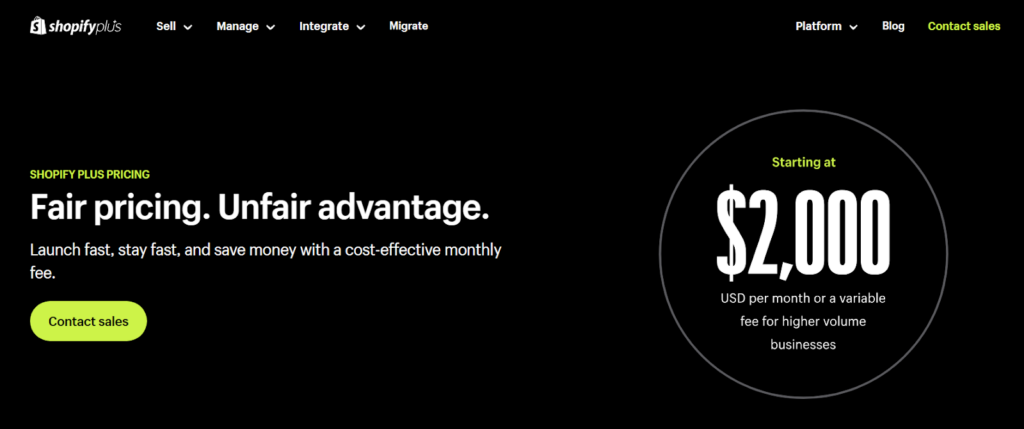
6. Salesforce Commerce Cloud
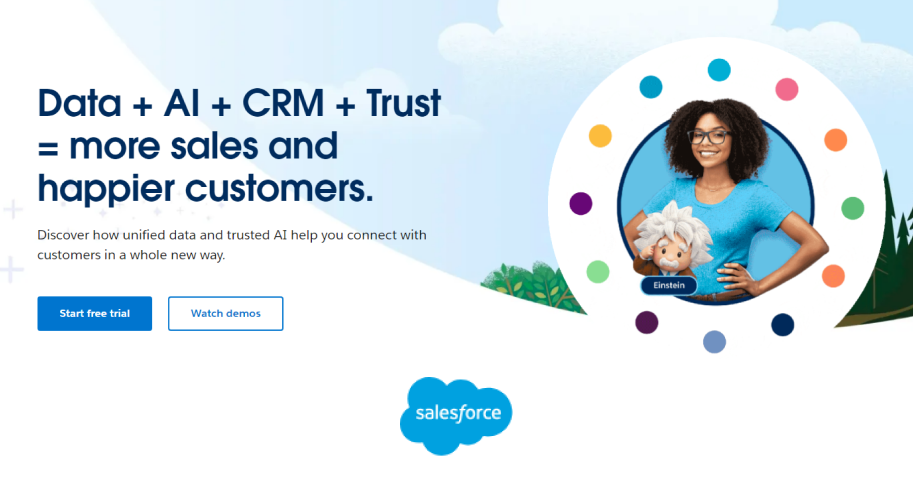
So, here’s the second dominant player!
After Shopify, Salesforce is a prominent leader among enterprise eCommerce platforms in 2023 in Gartner’s Magic Quadrant, offering a wide array of solutions tailored to diverse enterprise eCommerce systems and commerce needs.
Salesforce’s portfolio of eCommerce features includes B2C Commerce Cloud for enterprises selling to consumers at scale, B2B Commerce for eCommerce operations and engaging with other businesses, and D2C (formerly B2B2C). These products may be licensed individually or together under the umbrella of “Salesforce Commerce.”
Salesforce also offers several supplementary products like Customer Data Platform (CDP), Order Management System (OMS), Sales Force Automation (SFA), B2B marketing automation, and customer relationship management and service solutions, enriching the overall e-commerce customer experience further.
Key Features
Salesforce’s Enterprise E-commerce offering is equipped with a rich set of features to meet your digital commerce requirements:
- Integration to Social Channels: Seamlessly connect with social media platforms to expand your reach.
- Phased Headless Rollouts: Transition from native, template-based storefronts to progressive web apps (PWAs) incrementally.
- Page Designer Support: Customize and compose your storefront with ease.
- Store Fulfillment App: Streamline order fulfillment operations for your online store.
Why Salesforce?
- Product Development Velocity: Continuous innovation with frequent releases of new features across all platforms.
- Personalization Capabilities: Robust personalization functionality in both B2B and B2C platforms, leveraging customer, product, and order data from other Salesforce applications.
- Headless Enablement for B2C: Phased headless rollout capabilities allow for a smooth transition to PWAs, enabling a flexible and modern shopping experience.
Limitations of Salesforce Commerce Cloud
- High cost: It is a premium eCommerce platform, and it can be expensive for small businesses.
- Complexity: Salesforce can be complex to implement and use, and it requires a high level of technical expertise.
- Limited customization options: It’s a SaaS platform, which means that it is not as customizable as some other eCommerce platforms.
- Integration challenges: It can be difficult to integrate with third-party systems.
Pricing: Know pricing here!
7. BetterCommerce

BetterCommerce is a headless & composable commerce stack that caters to mid-market to enterprise businesses. It works on the API–first approach making it hyper-flexible to innovate faster at scale. BetterCommerce stack offers many out-of-the-box features that make it easy for retailers to go live faster with minimum hassle.
BetterCommerce end-to-end e-commerce solutions are modular in architecture and include the following modules: PIM, eCommerce, CMS, OMS, Analytics, and Engage.
The storefront offered is on next.js making it developer-friendly to optimise for ultra-speed. The modules allow seamless integration with your current tech stack or can be used together for re-platforming.
Key Features
BetterCommerce offers many out-of-the-box features than others in the same space:
- Visual Merchandising
- Advance Search, Synonym Dictionary & Keyword Redirections
- Advance Promotions
- Multi-Language, Multi-payment, and Multi-Brand Supported
- Offer omnichannel fulfillment options like BOPIS, ship from store, and endless aisle
- PIM & CMS as part of (DXP)
- Centralized Data Platform (CDP)
- Subscription Commerce
- B2B Commerce
- Membership & Loyalty Program Management
- Real-time Analytics & Retail Analytics
- Product Syndication to multiple channels
- Headless Storefront (Next.JS)
- Extensive Rest-based APIs
Why BetterCommerce?
BetterCommerce modular architecture combined with its out-of-the-box features, allows retailers to innovate and take the product to market faster keeping the total cost of ownership lower.
- Headless Architecture
- 6 modules covering end-to-end commerce
- B2B & B2C Commerce
- Headless PIM & Headless CMS
- Subscription & Memberships
- Cross Border Commerce
- Multi-brand retailing
- Marketplace integration
Limitations of BetterCommerce
- Technical requirements: To take full advantage of BetterCommerce’s customization capabilities, businesses will need to have some technical expertise.
- Pricing: BetterCommerce offers a custom pricing structure, which can make it difficult to budget for.
- Complexity: BetterCommerce offers a wide range of features, which can be overwhelming for new users.
Pricing
BetterCommerce offers multiple pricing models based on customer requirements and can be classified as either order volume-based, revenue share-based, or tiered-based. In any case, the minimum pricing on BetterCommerce Composable Stack starts at £2500 per month.
So, these were the top 7 enterprise eCommerce platforms to build composable commerce solutions you can choose from.
I understand it won’t be that easy to pick the most suitable from these best-of-breed solutions. Don’t worry, the section will help you!
Comparison: Best Enterprise Ecommerce Solutions
It is important to carefully compare the different enterprise eCommerce platforms before making a final decision. Unable to make the final decision?? Relax… and look at the detailed comparison table below!!
| Factors | commercetools | BigCommerce | Spryker | VTEX | Shopify | Salesforce | BetterCommerce |
| User-Friendly Interface | ✅ | ✅ | ✅ | ✅ | ✅ | ✅ | ✅ |
| Extensive App Ecosystem | ✅ | ✅ | ✅ | ✅ | ✅ | limited | ❌ |
| Scalable for Mid-sized Businesses | ✅ | ✅ | ✅ | ✅ | ✅ | ✅ | ✅ |
| Robust CRM Integration | ✅ | ✅ | ✅ | ✅ | ✅ | ✅ | ✅ |
| Exceptional Analytics | limited | limited | ❌ | limited | limited | limited | limited |
| High Customization Options | limited | limited | ✅ | ✅ | limited | ✅ | limited |
| SEO-Friendly Features | ✅ | ✅ | ✅ | ✅ | ✅ | ✅ | ✅ |
| Robust Security | ✅ | ✅ | ✅ | ✅ | ✅ | ✅ | ✅ |
| Headless Commerce Architecture | ✅ | ✅ | ✅ | ✅ | ✅ | ✅ | ✅ |
| Flexibility for Developers | ✅ | ✅ | ✅ | ✅ | limited | limited | limited |
| Cloud-Based | ✅ | ✅ | ✅ | ✅ | ✅ | ✅ | ✅ |
| Fully Integrated Platform | ✅ | ✅ | limited | ✅ | ✅ | ✅ | ✅ |
| International Expansion Support | ✅ | ✅ | ✅ | ✅ | ✅ | ✅ | ✅ |
| Real-time Inventory Management | ✅ | ✅ | ✅ | ✅ | ✅ | ✅ | ✅ |
| Unified Commerce Platform | ✅ | ✅ | ✅ | ✅ | ✅ | ✅ | ✅ |
| Order Management | ✅ | ✅ | ✅ | ✅ | ✅ | ✅ | ✅ |
| Multi-channel Sales | ✅ | ✅ | ✅ | ✅ | ✅ | ✅ | ✅ |
| Secure Payment Processing | ✅ | ✅ | ✅ | ✅ | ✅ | ✅ | ✅ |
| B2B and B2C Capabilities | ✅ | ✅ | ✅ | ✅ | ✅ | ✅ | ✅ |
| AI-Driven Personalization | limited | ✅ | ❌ | ❌ | limited | limited | limited |
| Marketing Automation | ✅ | ✅ | ❌ | ✅ | ✅ | ✅ | ❌ |
| Multi-Currency Support | ✅ | ✅ | ✅ | ✅ | ✅ | ✅ | ✅ |
| Mobile Optimization | ✅ | ✅ | ✅ | ✅ | ✅ | ✅ | ✅ |
| Microservices Architecture | ✅ | limited | ✅ | ✅ | ✅ | ✅ | ✅ |
| API-First Approach | ✅ | ✅ | ✅ | ✅ | ✅ | ✅ | ✅ |
| Omnichannel Commerce | ✅ | ✅ | ✅ | ✅ | ✅ | ✅ | ✅ |
| Marketplace Capabilities | ✅ | ❌ | ✅ | ✅ | ✅ | ✅ | ✅ |
| AI-Driven Predictive Search | limited | limited | ❌ | limited | limited | limited | ❌ |
| Native CMS | ✅ | limited | ✅ | ✅ | ✅ | ✅ | ✅ |
| Customization Through Modules | ✅ | ✅ | ✅ | ✅ | ✅ | ✅ | ✅ |
| Multi-Tenant Capability | ❌ | ❌ | ❌ | ✅ | ❌ | ✅ | ✅ |
| Inventory Visibility | ✅ | ✅ | ✅ | ✅ | ✅ | ✅ | ✅ |
| Customer Data Management | ✅ | ✅ | ✅ | ✅ | ✅ | ✅ | ✅ |
| Multi-Store Management | ✅ | ✅ | ✅ | ✅ | ✅ | ✅ | ✅ |
| Third-party Integrations | ✅ | limited | limited | ✅ | ✅ | ✅ | ✅ |
| Ease of use | ❌ | ❌ | ❌ | ✅ | ✅ | limited | ❌ |
| Quick Time to market | ❌ | ✅ | ✅ | ✅ | ✅ | limited | ✅ |
| Excellent Customer support | ✅ | limited | ✅ | ✅ | ✅ | ✅ | ✅ |
| No Transaction fees | ✅ | ❌ | ❌ | ❌ | ❌ | ❌ | ✅ |
Please note that this is just a general evaluation, and your specific needs may vary. It is always best to consult with Digital Commerce Experts to ensure that the platform is the right fit for your enterprise-level business.
We understand, that big decisions often come with difficulties!! That’s why, we are still holding you back.
Which Enterprise Ecommerce Solution is right for you?
If you are planning to expand your business rapidly, you will need a platform that can scale with you. The best enterprise eCommerce platform for you will depend on your specific business needs and budget.
If you’re looking for something easy to use and scalable, Shopify Plus is a good option. If you need more customization and advanced features, Salesforce Commerce Cloud, commercetools, VTEX, Spryker, or BetterCommerce may be a better fit.
Here are some additional tips for choosing an enterprise eCommerce platform:
- Think about your business needs: What features are important to you? How much customization do you need? What’s your budget?
- Read reviews from other businesses: This will give you a good idea of the pros and cons of different platforms.
- Get demos from multiple vendors: This will help you to compare the different platforms and see which one is the best fit for your business.
- Ask about pricing and support: Make sure that you understand the pricing structure of each platform and that the vendor offers good customer support.
Choosing the right enterprise platform is an important decision for your business.
Wrapping Up!
When building a house, we make sure the base is strong. Similarly, you need a strong and scalable base when you are building your enterprise eCommerce business.
In this blog, we have explored various SaaS eCommerce platforms that will help you build your Composable commerce eCommerce solution.
Consider the following factors when making your decision:
- Features: What features are important to you? Do you need a platform with advanced features such as personalization, order management, and CRM?
- Customization: How much customization do you need? If you need a highly customizable platform, you may want to choose a platform such as commercetools, VTEX, Spryker, or BetterCommerce.
- Technical expertise: Do you have the technical expertise to set up and use a complex platform? If not, you may want to choose a platform that is easier to use, such as Shopify or BigCommerce.
- Budget: How much are you willing to spend on an enterprise ecommerce platform? Salesforce is the most expensive platform on the list, while Shopify is the least expensive.
Now, it’s your turn to choose the right enterprise eCommerce platform based on your business goals and growth plans.
If you’ve picked the right platform for your enterprise business, the next step is to get the super personalized storefront! And we can create exceptional storefronts for your composable eCommerce store whether it’s on Shopify, Magento, SAP Commerce Cloud, or commercetools.Are you also in search of the right DXP for your Composable commerce stores?? Let’s find it out by comparing the Best Digital Experience Platforms (DXPs)!






Post a Comment
Got a question? Have a feedback? Please feel free to leave your ideas, opinions, and questions in the comments section of our post! ❤️